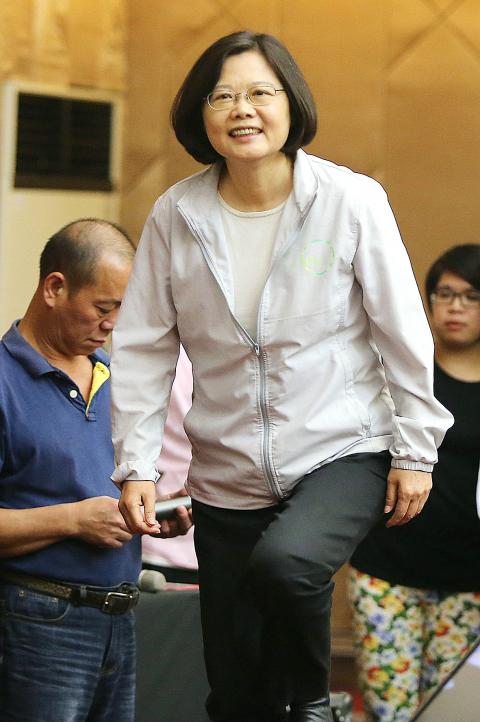Democratic Progressive Party (DPP) presidential candidate Tsai Ing-wen (蔡英文) yesterday said that the biggest difference between her call for “maintaining the status quo” and President Ma Ying-jeou’s (馬英九) is “democracy.”
Asked about Ma’s remarks that he has established the cross-strait “status quo,” Tsai said that many Taiwanese would probably not agree.
Tsai said the status quo she has promised to maintain is “the status quo of Taiwan’s liberal democracy and cross-strait peace,” which are the most significant elements.

Photo: CNA
“The ‘status quo’ we have now is the outcome achieved together by Taiwanese, who have made great efforts in the past 20 or so years. It is not something that any person could interpret as he likes or according to his will,” Tsai said.
“The most conspicuous difference between the ‘status quo’ I would strive to maintain and the one upheld by President Ma is democracy, which is the right of the 23 million Taiwanese to decide their own future. This ‘status quo’ cannot be altered,” the DPP chairperson said.
Regarding the president’s comment that he is building a bridge for his successor, Tsai said that Taiwanese society is not against cross-strait exchanges or those between the leaders of the two sides, “but the bridge must have a well-founded base, which is Taiwan’s public opinion and democracy.”
“The bridge must be built upon a solid foundation that consists of democratic procedure, transparency and effective legislative supervision. However, what we have witnessed this time is that the president has failed to realize that what the people of a democracy expect is not simply a result, but that this outcome has to emerge from a democratic procedure that is supervised by the legislature with relevant information available to the public,” Tsai said, referring to Ma’s meeting today with Chinese President Xi Jinping (習近平).
In related news, the DPP yesterday said that a poll found that 65.9 percent of the public have little trust in Ma’s ability to handle cross-strait affairs.
According to the poll it conducted on Wednesday and Thursday, 74 percent of respondents agree that Ma should have undertaken communication with the legislature and the opposition parties beforehand, while 17.3 percent disagreed.
The poll found 59.5 percent agree that the president’s public announcement about the Ma-Xi meeting only days before the event is a “black-box” operation that had sidestepped due supervision, while 29.9 percent disagreed.
The poll found 66.8 percent agreed that Ma should not make major cross-strait policy proclamations during the meeting when he has only half a year left in office.
The poll collected 926 valid samples from citizens aged 20 or above across the nation. It has a confidence level of 95 percent and a margin of error of plus or minus-3.2 percentage points.

CHANGING LANDSCAPE: Many of the part-time programs for educators were no longer needed, as many teachers obtain a graduate degree before joining the workforce, experts said Taiwanese universities this year canceled 86 programs, Ministry of Education data showed, with educators attributing the closures to the nation’s low birthrate as well as shifting trends. Fifty-three of the shuttered programs were part-time postgraduate degree programs, about 62 percent of the total, the most in the past five years, the data showed. National Taiwan Normal University (NTNU) discontinued the most part-time master’s programs, at 16: chemistry, life science, earth science, physics, fine arts, music, special education, health promotion and health education, educational psychology and counseling, education, design, Chinese as a second language, library and information sciences, mechatronics engineering, history, physical education

DEADLOCK: As the commission is unable to forum a quorum to review license renewal applications, the channel operators are not at fault and can air past their license date The National Communications Commission (NCC) yesterday said that the Public Television Service (PTS) and 36 other television and radio broadcasters could continue airing, despite the commission’s inability to meet a quorum to review their license renewal applications. The licenses of PTS and the other channels are set to expire between this month and June. The National Communications Commission Organization Act (國家通訊傳播委員會組織法) stipulates that the commission must meet the mandated quorum of four to hold a valid meeting. The seven-member commission currently has only three commissioners. “We have informed the channel operators of the progress we have made in reviewing their license renewal applications, and

The High Prosecutors’ Office yesterday withdrew an appeal against the acquittal of a former bank manager 22 years after his death, marking Taiwan’s first instance of prosecutors rendering posthumous justice to a wrongfully convicted defendant. Chu Ching-en (諸慶恩) — formerly a manager at the Taipei branch of BNP Paribas — was in 1999 accused by Weng Mao-chung (翁茂鍾), then-president of Chia Her Industrial Co, of forging a request for a fixed deposit of US$10 million by I-Hwa Industrial Co, a subsidiary of Chia Her, which was used as collateral. Chu was ruled not guilty in the first trial, but was found guilty

Taiwan People’s Party (TPP) Chairman Huang Kuo-chang (黃國昌) yesterday appealed to the authorities to release former Taipei mayor Ko Wen-je (柯文哲) from pretrial detention amid conflicting reports about his health. The TPP at a news conference on Thursday said that Ko should be released to a hospital for treatment, adding that he has blood in his urine and had spells of pain and nausea followed by vomiting over the past three months. Hsieh Yen-yau (謝炎堯), a retired professor of internal medicine and Ko’s former teacher, said that Ko’s symptoms aligned with gallstones, kidney inflammation and potentially dangerous heart conditions. Ko, charged with